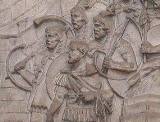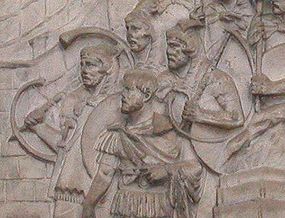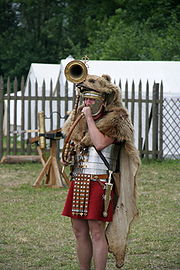
Cornicen
Encyclopedia
A cornicen was a junior officer
in the Roman Army
. The cornicen's job was to signal salutes to officers and sound orders to the legions. The cornicines played the cornu
(making him an aeneator
). Cornicines always marched at the head of the centuries, with the tesserary
and the signifer
. The cornicines were also used as assistants to a centurion
(like an optio
). The cornicen was a duplicary
or a soldier who got double the basic pay of the legionary
.
The music of the legion consists of trumpets, cornet
s and buccina
e. The trumpet sounds the charge and the retreat. The cornets are used only to regulate the motions of the colors; the trumpets serve when the soldiers are ordered out to any work without the colors; but in time of action, the trumpets and cornets sound together. The classicum, which is a particular sound of the buccina or horn, is appropriated to the commander-in-chief and is used in the presence of the general, or at the execution of a soldier, as a mark of its being done by his authority. The ordinary guards and outposts are always mounted and relieved by the sound of trumpet, which also directs the motions of the soldiers on working parties and on field days. The cornets sound whenever the colors are to be struck or planted. These rules must be punctually observed in all exercises and reviews so that the soldiers may be ready to obey them in action without hesitation according to the general's orders either to charge or halt, to pursue the enemy or to retire. For reason will convince us that what is necessary to be performed in the heat of action should constantly be practiced in the leisure of peace.


Junior officer
The term junior officer is sometimes used to make clear that an officer in a military or paramilitary unit is not in overall command. The term senior officer is reserved for the officer in overall command....
in the Roman Army
Roman army
The Roman army is the generic term for the terrestrial armed forces deployed by the kingdom of Rome , the Roman Republic , the Roman Empire and its successor, the Byzantine empire...
. The cornicen's job was to signal salutes to officers and sound orders to the legions. The cornicines played the cornu
Cornu (horn)
A cornu or cornum was a type of brass instrument similar to the buccina used by the Roman army of antiquity mainly for communicating orders to troops in battle. It is a Latin word literally meaning horn. The instrument was about long and took the form of a letter 'G'...
(making him an aeneator
Aeneator
An aeneator refers to a classical Roman professional performer of a horn who was attached to a Roman miltiary unit. The word comes from Latin aēneus or ahēneus, "brazen", from aes, "copper alloy".-Aeneators' role in war:...
). Cornicines always marched at the head of the centuries, with the tesserary
Tesserarius
A tesserarius , was a watch commander in the Roman army. They organized and had command over the nightly guard assigned to keep watch over the fort when in garrison or on campaign and were responsible for getting the watchwords from the commander and seeing that it was kept safe. There was one...
and the signifer
Signifer
A signifer was a standard bearer of the Roman legions. He carried a signum for a cohort or century. Each century had a signifer and within each cohort the first century's signifer would be the senior....
. The cornicines were also used as assistants to a centurion
Centurion
A centurion was a professional officer of the Roman army .Centurion may also refer to:-Military:* Centurion tank, British battle tank* HMS Centurion, name of several ships and a shore base of the British Royal Navy...
(like an optio
Optio
An optio , sometimes anglicized option , was a soldier in the Roman army who held a position similar to that of an executive officer in modern armies...
). The cornicen was a duplicary
Duplicarius
A duplicary was a pay grade in the Roman Army receiving double the basic pay. The grade could also be awarded to ordinary legionary soldiers, regardless of rank, as a reward for outstanding bravery or service....
or a soldier who got double the basic pay of the legionary
Legionary
The Roman legionary was a professional soldier of the Roman army after the Marian reforms of 107 BC. Legionaries had to be Roman citizens under the age of 45. They enlisted in a legion for twenty-five years of service, a change from the early practice of enlisting only for a campaign...
.
The cornicen
The late Roman writer Vegetius, in his work De Re Militari, wrote:The music of the legion consists of trumpets, cornet
Cornu (horn)
A cornu or cornum was a type of brass instrument similar to the buccina used by the Roman army of antiquity mainly for communicating orders to troops in battle. It is a Latin word literally meaning horn. The instrument was about long and took the form of a letter 'G'...
s and buccina
Buccina
A buccina or bucina , anglicized buccin or bucine, is a brass instrument used in the ancient Roman army similar to the Cornu. An aeneator who blew a buccina was called a "buccinator" or "bucinator" ....
e. The trumpet sounds the charge and the retreat. The cornets are used only to regulate the motions of the colors; the trumpets serve when the soldiers are ordered out to any work without the colors; but in time of action, the trumpets and cornets sound together. The classicum, which is a particular sound of the buccina or horn, is appropriated to the commander-in-chief and is used in the presence of the general, or at the execution of a soldier, as a mark of its being done by his authority. The ordinary guards and outposts are always mounted and relieved by the sound of trumpet, which also directs the motions of the soldiers on working parties and on field days. The cornets sound whenever the colors are to be struck or planted. These rules must be punctually observed in all exercises and reviews so that the soldiers may be ready to obey them in action without hesitation according to the general's orders either to charge or halt, to pursue the enemy or to retire. For reason will convince us that what is necessary to be performed in the heat of action should constantly be practiced in the leisure of peace.



